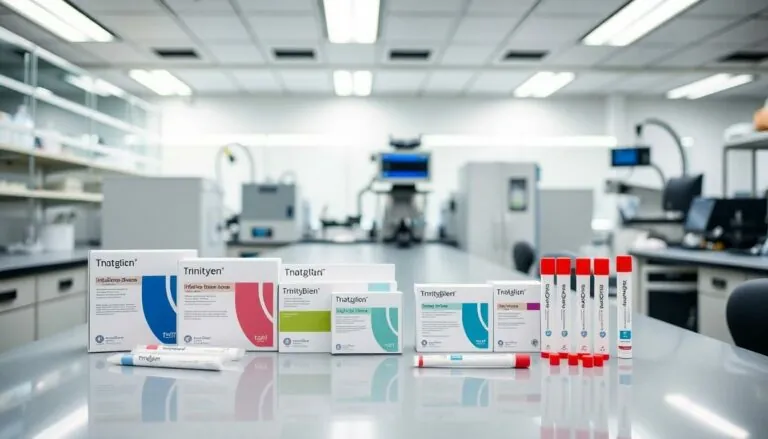Table of Contents
ToggleIn a world where science fiction meets reality, biotech startups are leading the charge into uncharted territories. These innovative companies are not just tinkering with petri dishes; they’re revolutionizing healthcare, agriculture, and even our dinner plates. Imagine a future where diseases are conquered before they even have a chance to show up—sounds like magic, right? But it’s all thanks to the brilliant minds behind these startups, mixing biology with a sprinkle of entrepreneurial spirit.
Overview of Biotech Startups
Biotech startups focus on leveraging biological processes to develop innovative products. These companies target areas like pharmaceuticals, agriculture, and environmental management. Research and development play critical roles in driving advancements within these firms.
Artificial intelligence integration enhances discovery processes. It allows startups to analyze vast datasets quickly, leading to more efficient research outcomes. Moreover, collaborations with academic institutions foster a culture of innovation, enabling access to state-of-the-art technology and talent.
Investment in biotech startups surged, especially in 2020. This boom resulted in a record $18 billion in venture capital funding for the sector. Investors recognize the potential for significant returns, driven by groundbreaking advancements that promise improved quality of life.
Regulatory pathways present challenges for biotech startups. Navigating approval processes from agencies, such as the FDA, requires thorough understanding and strategic planning. However, successful navigation often leads to high rewards, as approved products can dominate their markets.
Global competition intensifies within the biotech landscape. Startups across continents innovate rapidly, pushing each other to achieve breakthroughs. This competitive environment encourages companies to refine strategies constantly and enhance efficiency.
The future of biotech startups remains promising. Their focus on sustainable and impactful solutions positions them as key players in addressing global challenges. As technology advances and funding continues, these firms will likely transform various industries, impacting lives worldwide.
Key Trends in the Biotech Industry

Biotech startups continually evolve, reflecting key trends that shape their landscape. This section covers significant advancements and regulatory changes driving innovation and transformation.
Advances in Technology
Artificial intelligence plays a crucial role in biotech developments. Startups now utilize AI algorithms to streamline research, enabling faster data analysis and drug discovery. CRISPR technology further revolutionizes genetic editing, allowing precise modifications in organisms. Automation and robotics enhance laboratory efficiency, reducing time and labor costs. Bioprinting emerges as a valuable tool, facilitating the creation of complex biological structures for research and medical applications. Wearable health technologies track individual health data, leading to personalized medicine solutions. These technical advances collectively position biotech startups at the forefront of healthcare innovation.
Impact of Regulatory Changes
Legislative reforms significantly influence biotech operations. Recently updated policies aim to expedite drug approval processes, encouraging faster market entry for innovative therapies. Regulatory bodies focus on streamlining guidelines, making it easier for startups to navigate complex compliance requirements. Collaboration with government agencies fosters a transparent relationship, often resulting in shared goals for public health. Accelerated approval pathways enhance the viability of breakthrough therapies, attracting investor interest. External factors, such as global health crises, prompt reevaluation of regulatory frameworks, highlighting the need for flexibility. These changes empower biotech startups to respond quickly to emerging challenges.
Challenges Faced by Biotech Startups
Biotech startups encounter various significant challenges that can hinder their progress and success in an evolving industry. These obstacles require strategic planning, innovation, and adaptability.
Funding and Investment Issues
Access to sufficient funding remains a primary challenge for biotech startups. Investors may hesitate due to the long timelines required to develop and bring products to market. Competing against established companies also complicates funding efforts, as investors often favor proven entities. Presenting a solid business plan is crucial for attracting venture capital. Establishing partnerships can provide additional funding boosts while validating the startup’s potential. In 2020, the industry saw record venture capital funding of $18 billion, showing that with the right approach, opportunities for securing investments exist.
Navigating Clinical Trials
Clinical trials represent a complex hurdle in the development of biotech products. Biotech startups must follow stringent regulatory requirements throughout the process. They face high costs and lengthy timelines for trial phases that can extend over years. Maintaining compliance with FDA guidelines is essential to avoid delays or denials. Strategic planning helps streamline these trials and ensures effective communication with regulatory bodies. Collaborations with experienced contract research organizations can enhance trial efficiency and credibility, enabling startups to focus resources on core innovation activities.
Success Stories of Biotech Startups
Biotech startups are reshaping industries by providing groundbreaking solutions. Ginkgo Bioworks exemplifies this trend by leveraging synthetic biology for agricultural applications. Their approach enhances crop yields through tailored microbes, which boosts sustainability in farming practices.
Another success story, Moderna, gained global recognition for its mRNA technology. This innovation delivered a COVID-19 vaccine in record time, demonstrating the potential for rapid development of effective therapeutics. The company’s ability to pivot swiftly underscores the agility inherent in biotech startups.
Zymergen, focusing on molecular engineering, showcases the versatility of biotech advancements. By producing bio-based materials for various industries, it emphasizes the economic benefits of sustainable alternatives. Their success highlights the importance of investing in environmentally friendly solutions.
Other notable examples include CRISPR Therapeutics, which utilizes gene editing to combat genetic disorders. Their collaborations with research institutions facilitate ongoing innovation and contribute to promising clinical trial outcomes. These partnerships enhance their operational capacity and position them favorably within a competitive landscape.
Aforza’s focus on AI-enabled platforms demonstrates the intersection of technology and biotechnology. Their solutions streamline drug discovery processes, increasing efficiency and reducing time-to-market. The startup illustrates how emerging technologies can optimize traditional biotech methods.
Increasing venture capital investment fuels the growth of these enterprises. In 2020, a record $18 billion was directed toward biotech startups, highlighting their potential for high returns. With enhancing technologies and strong market interest, these companies are poised to lead the way in groundbreaking research and innovation.
The Future of Biotech Startups
Biotech startups are poised to shape the future significantly in healthcare and agriculture. By leveraging ongoing advancements, these companies tackle global challenges and push innovative boundaries. Factors such as artificial intelligence and machine learning streamline research, making drug discovery more efficient.
Increased venture capital funding, like the record $18 billion achieved in 2020, highlights investor confidence in biotech’s potential. Collaboration with academic institutions enhances access to cutting-edge technology. Strategic partnerships often facilitate knowledge exchange and foster an innovative climate.
AI plays an integral role in data analysis, informing research strategies and accelerating product development timelines. CRISPR technology revolutionizes genetic editing, enabling precision in a way not seen before. Bioprinting introduces possibilities in creating complex biological structures, pushing the envelope in medical and agricultural applications.
Regulatory frameworks are evolving to expedite approval processes. Legislative changes result in simplified compliance, allowing startups to bring solutions to market sooner. Organizations that adapt swiftly to these shifts tend to attract more investor interest.
Challenges still remain for biotech startups. Securing funding can prove difficult due to longer development timelines relative to traditional industries. Competing with established companies may deter potential investors, thus emphasizing the importance of a solid business plan.
Clinical trials present another hurdle, as they involve stringent requirements and significant costs. Strategic planning in trial design can enhance efficiency. Collaborations with seasoned research organizations may alleviate some of these challenges.
Success stories abound in the biotech realm. Ginkgo Bioworks utilizes synthetic biology for agriculture, while Moderna’s groundbreaking mRNA technology transformed vaccine development timelines. Startups like Zymergen and CRISPR Therapeutics exemplify the transformative power of innovation. Their efforts position them as leaders in a rapidly changing landscape.
Biotech startups are at the forefront of innovation, driving significant advancements across healthcare and agriculture. Their ability to harness biological processes and integrate cutting-edge technologies positions them as pivotal players in addressing global challenges.
As they navigate complex regulatory landscapes and secure funding, these companies continue to reshape industries with groundbreaking solutions. The future holds immense potential for biotech startups, fueled by strategic collaborations and an unwavering commitment to sustainability.
With their focus on impactful innovations, these startups are not just transforming markets; they’re improving lives worldwide. The journey ahead promises to be exciting, as the biotech sector evolves and thrives in an increasingly competitive environment.






